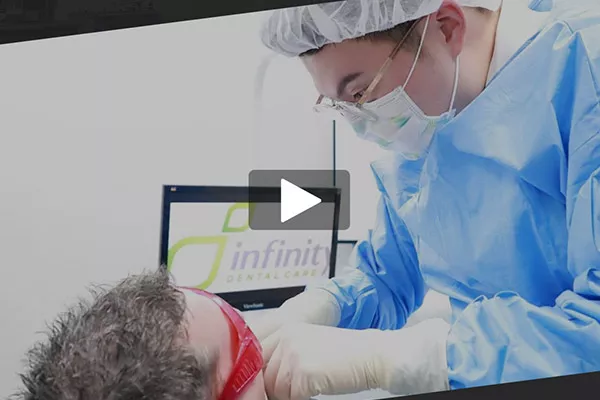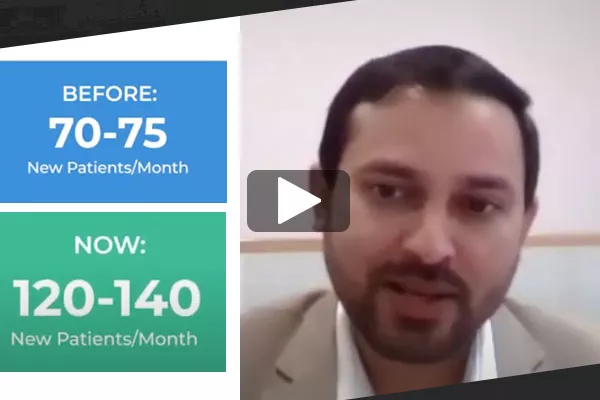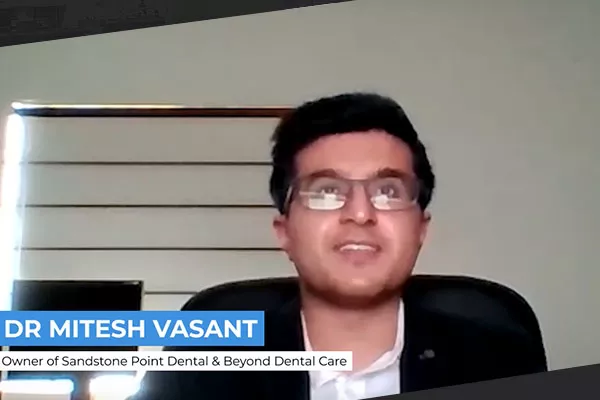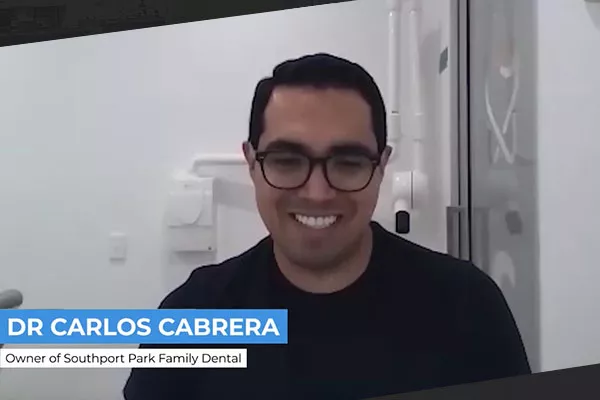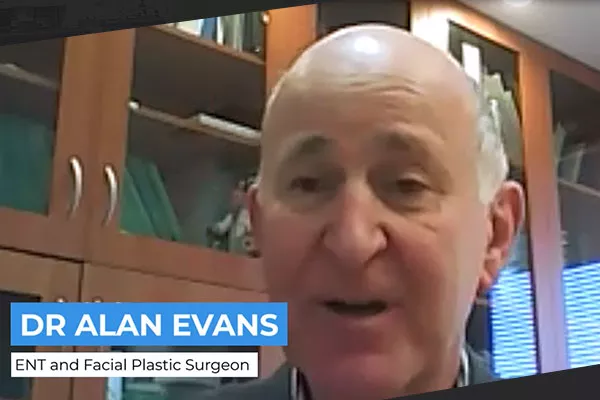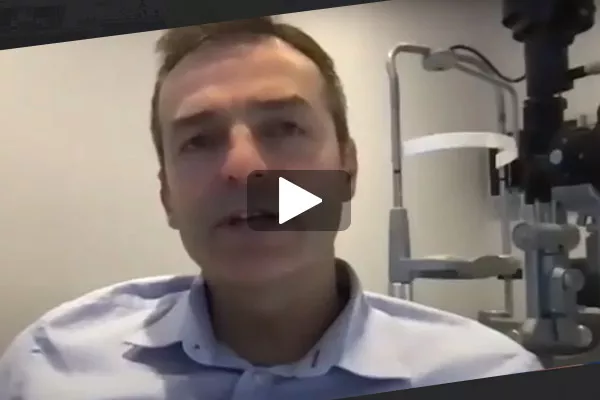Help Patients Find You Through
Dental SEO
Increase Your Revenue To Over $550K Monthly With New Patients
(New Patients Reaching Out Guaranteed)
We only take on a number of clinics in each suburb


We appreciate if you do not contact Mediboost’s clients directly as they are already very busy taking care of their patients.
Help Patients Find You Through Dental SEO
Increase Your Revenue To Over $550K Monthly With New Patients
We appreciate if you do not contact Mediboost’s clients directly as they are already very busy taking care of their patients.
(New Patients Reaching Out Guaranteed)
We only take on a number of clinics in each city

We work with growth-minded practices of all sizes

Hello Dental Practice Owners,
Are you having trouble seeing results from your existing SEO campaign?
Are you working with a generalist agency that doesn’t specialise in dental, and you feel like they just don’t understand your industry?
Do you have trouble tracking the ROI from our existing campaign?
Are you frustrated that you offer great treatments but the problem is that patients don’t know you exist?
You’re not alone. Many dental practices experience these same challenges during these uncertain times and when trying to grow, but few have discovered effective strategies that can generate consistent and trackable results.

Our Advanced Dental SEO Strategies will help you….
Understand your ROI through our New Patient Tracking system
See what our Dental Clients have to Say:

Dr Jack Yang
Dentist & Owner, Infinity Dental Care
Success Update From Dr Jack
Partnering With Mediboost for 3 Years and Counting
“For implant consultations, we are seeing probably at least on a day. Sometimes they have seen like five in a day”

Dr Jack Yang
Dentist & Owner, Infinity Dental Care

Shinu Joseph
Owner of Dapto Dentists & Woonona Dentists

Dr Mitesh Vasant
Owner of Sandstone Point Dental & Beyond Dental Care
“And it’s been three years now. And we’ve just grown and grown and grown, every month just gets better.“

Anthony Adaimy
Owner of Dental Spot

Dr Carlos Cabrera
Owner & Principal Dentist of Southport Park Family Dental
“When Mediboost came in, we’re certainly now exceeding 80, 90 phone calls a month easily for new clients and new patients”
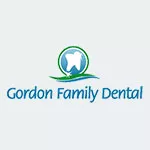
Dr Ken Ho
Owner of Gordon Family Dental
“When Mediboost came in, we’re certainly now exceeding 80, 90 phone calls a month easily for new clients and new patients”

Dr Alan Evans
ENT and Facial Plastic Surgeon

Dr Anton Van Heerden
Opthalmologist / Eye Surgeon
“Mediboost said it would take 6 months to see results but it didn’t take that long. First three months we saw an uptake straight away from 40 new patients, to 100 new patients to 150 patients to now 200 new patients per month. Now it’s on average, easily 150 to 200 new patients per month.”

Dr Sarah Morrison - Gardiner
Owner & General Practicioner, Health on 21

David Chen
Owner of Randiwck Smiles
“We’ve only opened about 4 and a half months and we already got between hundred twenty up to two hundred on the books.. So we’re bringing it about $30,000 a month just based on the advertising”

Dr. Glenn Parry
Owner & Dentist, Crestwood Family Dental

Dr Thi Nguyen
Dentist & Owner, Lotus Smiles Dental
It’s been over 1.5 years now with Mediboost and we’re getting on average 30 new patients per month. Since they have been able to get results for me, I’ve been recommending them to my colleagues in the dental industry. Thank you Mediboost, it has made a difference.
Note: Please note that results vary according to client (plan, location, competition, resources etc.)
See what our Dental Clients have to Say:
“We have worked with a fair few agencies in the past however none were able to achieve the results that Mediboost has gotten for us. Both SEO and Google ads campaigns have been very successful. New On average, we’re getting 70 new patients per month”
Dr Jack Yang
Dentist & Owner, Infinity Dental Care
“Mediboost said it would take 6 months to see results but it didn’t take that long. First three months we saw an uptake straight away from 40 new patients, to 100 new patients to 150 patients to now 200 new patients per month. Now it’s on average, easily 150 to 200 new patients per month.”
Dr Sarah Morrison
Owner & General Practitioner, Health on 21

Dr Thi Nguyen
Dentist & Owner, Lotus Smiles Dental
It’s been over 1.5 years now with Mediboost and we’re getting on average 30 new patients per month. Since they have been able to get results for me, I’ve been recommending them to my colleagues in the dental industry. Thank you Mediboost, it has made a difference.
Note: Please note that results vary according to client (plan, location, competition, resources etc.)
Mediboost’s Patient Growth
SEO Services
Dental SEO services with Mediboost begin with a strategy session in which we learn about your core services, study your competition and analyse the search engine volume of prospective patients looking for a dental website like yours. Through our analysis, we can calculate the number of new patients that our work will generate for you and estimate the return you’ll receive from your investment.
Are you too busy to meet us in person? No problem. We can also use teleconference software to discuss your dental marketing strategy remotely.
More Results
“Both SEO and Google Ads campaign have been very successful”
“We have worked with a fair few agencies in the past however none were able to achieve the results that Mediboost have gotten for us. Both SEO and Google ads campaign have been very successful. We wish we had met these guys earlier. If you are considering trying another company apart from Mediboost, don’t waste your time. Give these guys a go first.”

Dr Jack Yang
Dentist & Owner, Infinity Dental Care
“Results started appearing within the expected time frame”

Dr Paul Ansell
Principal Dentist, CP Dental
“The results we have achieved are far greater than the investment fee”

Dr Kenneth Wong
Principal dentist & Owner, Dental 266
More Results
“We have worked with a fair few agencies in the past however none were able to achieve the results that Mediboost have gotten for us. Both SEO and Google ads campaign have been very successful. We wish we had met these guys earlier. If you are considering trying another company apart from Mediboost, don’t waste your time. Give these guys a go first.”
“Both SEO and Google Ads campaign have been very successful”

Dr Jack Yang
Dentist & Owner, Infinity Dental Care
“Results started appearing within the expected time frame”

Dr Paul Ansell
“The results we have achieved are far greater than the investment fee”

Dr Kenneth Wong
Principal dentist & Owner, Dental 266
More Results
“Easily 150 to 200 new patients per month”
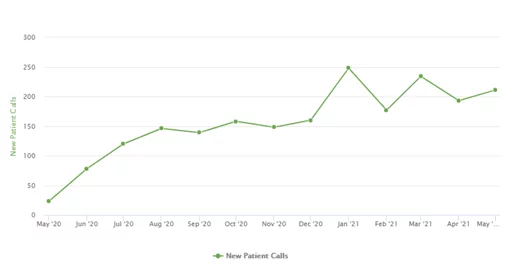

Dr Sarah Morrison
Owner & General Practitioner, Health on 21
“Enabled us to achieve our goal in the expected time frame”
The Mediboost team came up with a proposed plan and we followed their advice which enabled us to achieve our goal in the expected time frame. Thanks Mediboost Team!”

Dr Cecilia So
Dental Surgeon, Surgical Dental Services
“Even during COVID, we have been busy with new patients”

Dr Elizabeth Ng
Principal Dentist, Our Dental Care
“We’re getting on average around 30 new patients per month”

“Consistent and
effective job at marketing our business to our community”
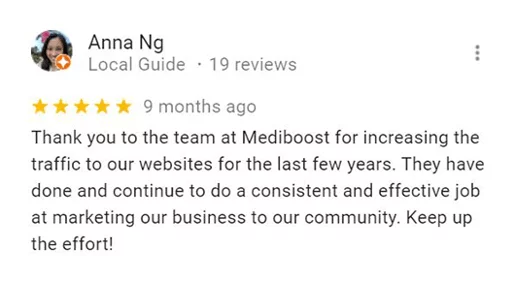
Note: Please note that results vary according to client (plan, location, competition, resources etc.)
More Results

Dr Sarah Morrison
Owner & General Practitioner, Health on 21
“Easily 150 to 200 new patients per month”

The Mediboost team came up with a proposed plan and we followed their advice which enabled us to achieve our goal in the expected time frame. Thanks Mediboost Team!”
“Enabled us to achieve our goal in the expected time frame”

Dr Cecilia So
Dental Surgeon, Surgical Dental Services

“We’re getting on average around 30 new patients per month”
“Consistent and
effective job at marketing our business to our community”

Note: Please note that results vary according to client (plan, location, competition, resources etc.)
Frequently Asked Questions
To help you make the most-informed decision, below are some common questions dentists ask us. You have other questions? Just book a call with us today.
Is Your Dental Website increasing your revenue?
Your dental website is the best salesperson your practice has. It’s always open and never goes on holiday. It’s always available to answer prospective patients’ questions. Before your website can help you generate new patients, though, people must know that it exists.
If your website is doing well, it’s generating awareness of your services and bringing in a consistent number of new patient calls or enquiries each month. It’s helping you generate more revenue by helping prospective patients find you in the search engines. If your patients can’t find your website when they search for a new dentist around your area, then you’re missing out on plenty of opportunities!
Generate consistent new patients monthly
Imagine having a website that brings your practice new patient calls each month. What does it mean to your practice getting an extra 20, 40, or 80 more patients requesting to book in with your clinic?
How do you think your receptionists will perform when they know their calls are being monitored through phone recording? Do you think the conversions will increase?
Mediboost’s Patient Growth SEO Services
Dental SEO services with Mediboost begin with a strategy session in which we learn about your core services, study your competition and analyse the search engine volume of prospective patients looking for a dental website like yours. Through our analysis, we can calculate the number of new patients that our work will generate for you and estimate the return you’ll receive from your investment.
Are you too busy to meet us in person? No problem. We can also use teleconference software to discuss your dental marketing strategy remotely.
Is it that important to go with a dental SEO agency?
Of course! Major digital marketing agencies don’t understand dental SEO. Large digital marketing agencies attempt to deliver SEO services to businesses in every industry — and they often fail to understand the particulars of certain industries as a result. At Mediboost, we are exclusively a medical and dental SEO company. Focusing on medical and dental marketing has allowed us to streamline our offerings. We event have a retired dentist and a hygienist that works with us to ensure quality tailored campaigns for a dental clients.
What do you mean by monthly search volume?
Monthly search volume of keywords means the number of people that are looking for a particular keyword in the search engines. For example, did you know that at least 1,600 people search for a dentist in Burwood each month? In Randwick, at least 800 people are looking for a dentist right now. How many people are searching for a dentist in your suburb? Before we take you on as a dental SEO client, we’ll analyse the search traffic for your region to determine how many new patients we can acquire for you.
Why do practices choose Mediboost?
Many of our new clients come to us because their experiences with other SEO agencies have left them unsatisfied. Large SEO firms earn their money from the bulk acquisition of new business. They don’t have the time to devote personal attention to their clients because before the ink is dry on one contract, they’ve already moved on to securing the next deal.
Our clients have told us that other SEO firms:
- Have secured first-page rankings — but only for keywords with little value
- Have failed to attract new patient calls
- Have used optimisation techniques forbidden by Google’s Webmaster Guidelines
- Have become unresponsive after receiving payment
- Have locked down websites or otherwise made contracts difficult to terminate
Here’s how Mediboost is different:
- We offer full transparency regarding the keywords we’ll target, the search volume of those keywords and what we’ll do to help your dental website rank for those keywords.
- Your practice’s acquisition of new business is our primary success metric.
- We adhere strictly to Google’s Webmaster Guidelines.
- We believe in open lines of communication. It’ll be us chasing you down to schedule meetings — not the other way around.
How do you track and report on results?
Live Call Tracking Dashboard
Our experience in the dental industry allows us to estimate the number of new patient calls after you engage our services. One of our unique dental website services is a solution that automatically records phone conversations with patients. Our dashboard can differentiate between new and existing patients. It records caller ID information and even provides a way for you to attach notes to call files.
Peace of Mind Monthly Reporting
Our local SEO experts will schedule monthly conferences in which we discuss the performance of your campaign and provide advice regarding your practice’s future growth. Each month, we’ll provide a concise report detailing the number of new patient calls and signups received during the reporting period. Our report will also list the updates we’ve made to your dental website, summarise the results of your dental ads and marketing initiatives and display your website’s current keyword rankings on Google.
How many people would I be working with?
We’ll assign a dental marketing expert from our team to serve as the dedicated project manager for your practice. The project manager will assist with liaising between you and the delivery team. A dental consultant will also be involved to formulate your overall SEO strategy to create the best dental ads to serve your needs.
I’ve had bad experience with account managers at SEO companies, what’s different about Mediboost with account management?
Have you worked with another digital marketing agency in the past? After you signed a contract, you probably found it difficult to get the personal attention you required. At Mediboost, we are different because we accept a limited number of new clients per month. Once we reach our limit, additional prospective clients go on a waiting list. Our firm limit on new client onboarding ensures that we can devote the time necessary to position our clients for success and that we never fail to deliver the personal attention our clients need.
- Is Your Dental Website increasing your revenue?
- Generate consistent new patients monthly
- Is it that important to go with a dental SEO agency?
- What do you mean by monthly search volume?

Your dental website is the best salesperson your practice has. It’s always open and never goes on holiday. It’s always available to answer prospective patients’ questions. Before your website can help you generate new patients, though, people must know that it exists.
If your website is doing well, it’s generating awareness of your services and bringing in a consistent number of new patient calls or enquiries each month. It’s helping you generate more revenue by helping prospective patients find you in the search engines. If your patients can’t find your website when they search for a new dentist around your area, then you’re missing out on plenty of opportunities!
Imagine having a website that brings your practice new patient calls each month. What does it mean to your practice getting an extra 20, 40, or 80 more patients requesting to book in with your clinic?
How do you think your receptionists will perform when they know their calls are being monitored through phone recording? Do you think the conversions will increase?
Of course! Major digital marketing agencies don’t understand dental SEO. Large digital marketing agencies attempt to deliver SEO services to businesses in every industry — and they often fail to understand the particulars of certain industries as a result. At Mediboost, we are exclusively a medical and dental SEO company. Focusing on medical and dental marketing has allowed us to streamline our offerings. We event have a retired dentist and a hygienist that works with us to ensure quality tailored campaigns for a dental clients.
Monthly search volume of keywords means the number of people that are looking for a particular keyword in the search engines. For example, did you know that at least 1,600 people search for a dentist in Burwood each month? In Randwick, at least 800 people are looking for a dentist right now. How many people are searching for a dentist in your suburb? Before we take you on as a dental SEO client, we’ll analyse the search traffic for your region to determine how many new patients we can acquire for you.
- Why do practices choose Mediboost?
- How do you track and report on results?
- How many people would I be working with?
- I’ve had bad experience with account managers at SEO companies, what’s different about Mediboost with account management?
Many of our new clients come to us because their experiences with other SEO agencies have left them unsatisfied. Large SEO firms earn their money from the bulk acquisition of new business. They don’t have the time to devote personal attention to their clients because before the ink is dry on one contract, they’ve already moved on to securing the next deal.
Our clients have told us that other SEO firms:
- Have secured first-page rankings — but only for keywords with little value
- Have failed to attract new patient calls
- Have used optimisation techniques forbidden by Google’s Webmaster Guidelines
- Have become unresponsive after receiving payment
- Have locked down websites or otherwise made contracts difficult to terminate
Here’s how Mediboost is different:
- We offer full transparency regarding the keywords we’ll target, the search volume of those keywords and what we’ll do to help your dental website rank for those keywords.
- Your practice’s acquisition of new business is our primary success metric.
- We adhere strictly to Google’s Webmaster Guidelines.
- We believe in open lines of communication. It’ll be us chasing you down to schedule meetings — not the other way around.
Live Call Tracking Dashboard
Our experience in the dental industry allows us to estimate the number of new patient calls after you engage our services. One of our unique dental website services is a solution that automatically records phone conversations with patients. Our dashboard can differentiate between new and existing patients. It records caller ID information and even provides a way for you to attach notes to call files.
Peace of Mind Monthly Reporting
Our local SEO experts will schedule monthly conferences in which we discuss the performance of your campaign and provide advice regarding your practice’s future growth. Each month, we’ll provide a concise report detailing the number of new patient calls and signups received during the reporting period. Our report will also list the updates we’ve made to your dental website, summarise the results of your dental ads and marketing initiatives and display your website’s current keyword rankings on Google.
We’ll assign a dental marketing expert from our team to serve as the dedicated project manager for your practice. The project manager will assist with liaising between you and the delivery team. A dental consultant will also be involved to formulate your overall SEO strategy to create the best dental ads to serve your needs.
Have you worked with another digital marketing agency in the past? After you signed a contract, you probably found it difficult to get the personal attention you required. At Mediboost, we are different because we accept a limited number of new clients per month. Once we reach our limit, additional prospective clients go on a waiting list. Our firm limit on new client onboarding ensures that we can devote the time necessary to position our clients for success and that we never fail to deliver the personal attention our clients need.
Contact Us
We’d love to know how we could help. Get in touch for a chat or a meeting!
Let’s chat, enter your details below:
Terms & Conditions
Website must be at least 2 years indexed on google. Not limited to the tools of Google Analytics, Google Search Console, "Site map submission". We can search in archieve.org, Semrush, Ahref.
Any of the following tools will be used in reading the 1st-page main keyword metric; Serpfox, Semrush, Ahref




















